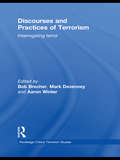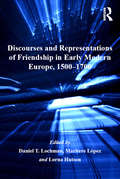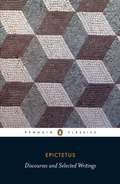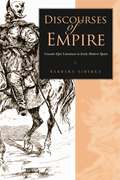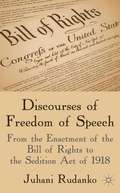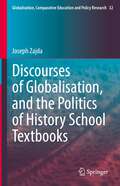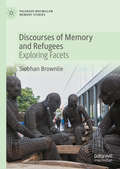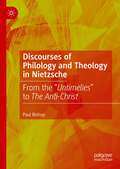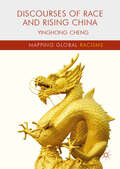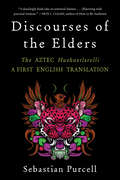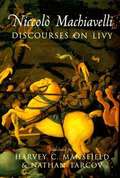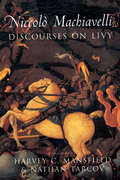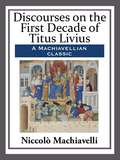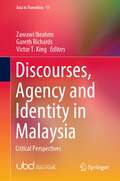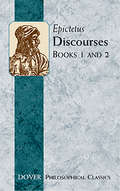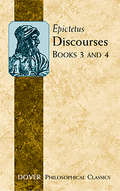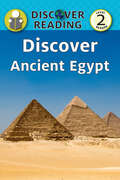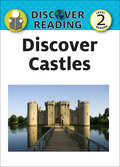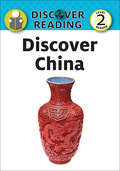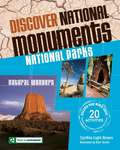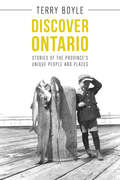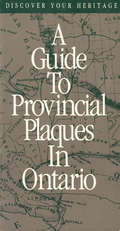- Table View
- List View
Discourses and Practices of Terrorism: Interrogating Terror (Routledge Critical Terrorism Studies)
by Bob BrecherThis interdisciplinary book investigates the consequences of the language of terror for our lives in democratic societies. The approach of this book is in direct contrast with those that either view terrorism simplistically, as a clear reality threatening democratic society and thus requiring certain sorts of response, or argue, equally simplistically, that the invocation of terror is merely the ideological veil for continued capitalist exploitation. While closer in spirit to the second of these, this work does not simply dismiss the discourse on terror, but rather investigates the consequences of this discourse for the organisation of life in democratic societies. In interrogating the discourse of terror from a variety of viewpoints, this interdisciplinary text builds upon the understanding of the importance of the language of terror from a new perspective: the interconnections between discourses of terror; the material realities they at once reflect and help produce; and the specificities of particular historical circumstances. In offering an integrated approach of this sort, and founded on a base of applied philosophy, broadly conceived, the contributors offer a new contribution to both public and academic debate, and at the same time initiate a series of further interventions in Critical Terrorism Studies. This book will be of interest to students of critical terrorism studies, terrorism studies, security studies, philosophy and discourse theory. Bob Brecher is Director of the Centre for Applied Philosophy, Politics & Ethics at Brighton University. He has published widely in moral, political and applied philosophy and the politics of higher education. Mark Devenney is Academic Programme Leader in Humanities at the University of Brighton. He has published in the areas of critical theory, post-Marxism and post-Colonial politics. Aaron Winter is Lecturer in Sociology at the University of Abertay Dundee. His research focuses on terrorism and the concept of ‘extremism’, whiteness, masculinity and violence, and the extreme right, organised racism and the religious right in the United States.
Discourses and Representations of Friendship in Early Modern Europe, 1500–1700
by Maritere LópezInterdisciplinary in scope, this collection examines the varied and complex ways in which early modern Europeans imagined, discussed and enacted friendship, a fundamentally elective relationship between individuals otherwise bound in prescribed familial, religious and political associations. The volume is carefully designed to reflect the complexity and multi-faceted nature of early modern friendship, and each chapter comprises a case study of specific contexts, narratives and/or lived friendships. Contributors include scholars of British, French, Italian and Spanish culture, offering literary, historical, religious, and political perspectives. Discourses and Representations of Friendship in Early Modern Europe, 1500-1700 lays the groundwork for a taxonomy of the transformations of friendship discourse in Western Europe and its overlap with emergent views of the psyche and the body, as well as of the relationship of the self to others, classes, social institutions and the state.
Discourses and Selected Writings
by Epictetus Robert Dobbin'I must die. But must I die bawling? 'Epictetus, a Greek stoic and freed slave, ran a thriving philosophy school in Nicropolis in the early second century AD. His animated discussions were celebrated for their rhetorical wizardry and were written down by Arrian, his most famous pupil. Together with the Enchiridion, a manual of his main ideas, and the fragments collected here, The Discourses argue that happiness lies in learning to perceive exactly what is in our power to change and what is not, and in embracing our fate to live in harmony with god and nature. In this personal, practical guide to the ethics of Stoicism and moral self-improvement, Epictetus tackles questions of freedom and imprisonment, illness and fear, family, friendship and love, and leaves an intriguing document of daily life in the classical world. In the introduction that accompanies this lively new translation, Robert Dobbin discusses Epitetus' life, his place in the Stoic tradition, his influence on world philosophies and his relevance in the modern day. This edition also includes a bibliography, notes and a glossary of names.
Discourses of Empire: Counter-Epic Literature in Early Modern Spain (Studies in Romance Literatures)
by Barbara SimerkaThe counter-epic is a literary style that developed in reaction to imperialist epic conventions as a means of scrutinizing the consequences of foreign conquest of dominated peoples. It also functioned as a transitional literary form, a bridge between epic narratives of military heroics and novelistic narratives of commercial success. In Discourses of Empire, Barbara Simerka examines the representation of militant Christian imperialism in early modern Spanish literature by focusing on this counter-epic discourse.Simerka is drawn to literary texts that questioned or challenged the imperial project of the Hapsburg monarchy in northern Europe and the New World. She notes the variety of critical ideas across the spectrum of diplomatic, juridical, economic, theological, philosophical, and literary writings, and she argues that the presence of such competing discourses challenges the frequent assumption of a univocal, hegemonic culture in Spain during the imperial period. Simerka is especially alert to the ways in which different discourses—hegemonic, residual, emergent—coexist and compete simultaneously in the mediation of power. Discourses of Empire offers fresh insight into the political and intellectual conditions of Hapsburg imperialism, illuminating some rarely examined literary genres, such as burlesque epics, history plays, and indiano drama. Indeed, a special feature of the book is a chapter devoted specifically to indiano literature. Simerka's thorough working knowledge of contemporary literary theory and her inclusion of American, English, and French texts as points of comparison contribute much to current studies of Spanish Golden Age literature.
Discourses of Freedom of Speech
by Juhani RudankoFreedom of speech is a tradition distinctive to American political culture, and this book focuses on major debates and discourses that shaped this tradition. It sheds fresh light on key Congressional debates in the early American Republic, developing and applying an approach to fallacy theory suitable to the study of political discourse.
Discourses of Globalisation, and the Politics of History School Textbooks (Globalisation, Comparative Education and Policy Research #32)
by Joseph ZajdaThis book focuses on discourses of the politics of history education and history textbooks. It offers a new insight into understanding of the nexus between ideology, the state, and nation-building, as depicted in history education and school textbooks. It especially focuses on the interpretation of social and political change, significant events, looking for possible biases and omissions, leadership and the contribution of key individuals, and continuities. The book discusses various aspects of historical narratives, and some selected key events in defining identity and nation-building. It considers the role of historiography in dominant historical narratives. It analyses history education, in both local and global settings, and its significance in promoting values education and intercultural and global understanding. It is argued that historical narratives add pedagogies, grounded in constructivist, metacognitive and transformational paradigms, have the power to engage the learner in significant and meaningful learning experiences, informed by multiple discourses of our historical narratives and those of other nations.
Discourses of Memory and Refugees: Exploring Facets (Palgrave Macmillan Memory Studies)
by Siobhan BrownlieThis book explores the discourse by and about refugees and asylum seekers in relation to memory with a particular focus on the United Kingdom. A series of studies using different analytical approaches is undertaken, and together the studies shed light on this overlooked area of research. The studies or ‘facets’ presented in the monograph cover a range of contexts and discursive genres: a joint BBC/refugee-authored television documentary, refugees’ oral histories, creative life writing by asylum seekers, parliamentarians’ debates, a reworking of canonical texts and sites in a protest campaign, and non-fiction testimonies and fictional works by later generations of refugee background. The monograph introduces ‘facet methodology’ to memory studies, arguing that this approach could encourage interdisciplinary research in the field.
Discourses of Philology and Theology in Nietzsche: From the “Untimelies” to The Anti-Christ
by Paul BishopThis study proposes to examine the tension in Nietzsche’s works between two competing discourses, i.e., the discourse of theology and the discourse of philology. It argues that, in order to understand Nietzsche’s complicated standpoint and the aim of his Kulturkritik, we have to appreciate how he operates with two different discourses, one indexed to belief, faith, liturgy (i.e., the discourse of theology) and another indexed to analytical reason, sceptical investigation, and logical argumentation, as well as historical context and linguistic precision (i.e., the discourse of philology). Its core thesis is that, in the end, Nietzsche can no longer believe, because he thinks he has uncovered a fraudulent production of meaning in the texts, in a way that is comparable with his insight into the production of morality in On the Genealogy of Morals (1887).
Discourses of Race and Rising China (Mapping Global Racisms)
by Yinghong ChengThis book is a critical study of the development of a racialised nationalism in China, exploring its unique characteristics and internal tensions, and connecting it to other forms of global racism. The growth of this discourse is contextualised within the party-state’s political agenda to seek legitimacy, in various groups’ efforts to carve their demands in a divided national community, and has directly affected identity politics across the global diasporic Chinese community. While there remains considerable debate in both academic literature and popular discussion about how the concept of ‘race’ is relevant to Chinese expressions of identity, Cheng makes a forceful case for the appropriateness of biological and familial narratives of descent for understanding Chinese nationalism today. Grounded in a strong conceptual framework and substantiated with rich materials, Discourses of Race and Rising China will be an important contribution to international studies of racism, and will appeal to academics and students of contemporary China, historians of modern China, and those who work in the fields of critical race, ethnicity, and cultural studies.
Discourses of Tolerance & Intolerance in the European Enlightenment
by Clorinda Donato Hans Erich Bödeker Peter ReillThe principle of tolerance is one of the most enduring legacies of the Enlightenment. However, scholarly works on the topic to date have been primarily limited to traditional studies based on a historical, 'progressive' view or to the critiques of contemporary writers such as Adorno, Horkheimer, Foucault, and MacIntyre, who believed that the core beliefs of the Enlightenment, including tolerance, could actually be used as vehicles of repression and control rather than as agents promoting individual and group freedom.This collection of original essays by a distinguished international group of contributors looks at the subject in a new light and from a number of angles, focusing on the concept of tolerance at the point where the individual, or group, converges or clashes with the state.The volume opens with introductory essays that provide essential background to the major shift in thinking in regard to tolerance that occurred during the eighteenth century, while considering the general problem of writing a history of tolerance. The remaining essays, organized around two central themes, trace the expansion of the discourses of tolerance and intolerance. The first group treats tolerance and intolerance in relation to the spheres of religious and political thought and practice. The second examines the extension of broad issues of tolerance and intolerance in the realms of race, gender, deviancy, and criminality. While offering an in-depth consideration of these complex issues in the context of the Enlightenment, the volume sheds light on many similar challenges facing contemporary society.
Discourses of the Elders: The Aztec Huehuetlatolli A First English Translation
by L. Sebastian Purcell“A dazzlingly fresh take on universal themes.… [B]ursting with practical wisdom.” —Skye C. Cleary, author of How to Be Authentic A philosophy grounded not in a transcendent divinity, afterlife, or individualism, but in a rooted communal life. Western philosophers have long claimed that God, if such a being exists, is a personal force capable of reason, and that the path to a good human life is also the path to a happy one. But what if these claims prove false, or at least deeply misleading? The Aztecs of central Mexico had a rich philosophical tradition, recorded in Latin script by Spanish clergymen and passed down for centuries in the native Nahuatl language—one of the earliest transcripts being the Huehuetlatolli, or Discourses of the Elders, compiled by Friar Andrés de Olmos circa 1535. Novel in its form, the Discourses consists of short conversations between elders and young people on how to achieve a meaningful and morally sound life. The Aztecs had a metaphysical tradition but no concept of “being.” They considered the mind an embodied force, present not just in the brain but throughout the body. Their core values relied on collective responsibility and group wisdom, not individual thought and action, orienting life around one’s actions in this realm rather than an afterlife, distinctly opposed to the Christian beliefs that permeate Europe and America. Sebastian Purcell’s fluency in his grandmother’s native Nahuatl brings to light the Aztec ethical landscape in brilliant clarity. Never before translated into English in its entirety, and one of the earliest post-contact texts ever recorded, Discourses of the Elders reflects the wisdom communicated by oral tradition and proves that philosophy can be active, communal, and grounded not in a “pursuit of happiness” but rather the pursuit of a meaningful life.
Discourses on Livy
by Niccolo Machiavelli Harvey C. Mansfield Nathan TarcovA commentary on Titus Livius's (Livy's) work on Roman History, "The Discourses on Livy" is Niccolo Machiavelli's examination of the structure and benefit of the republic. Considered the most important work on the subject of republicanism in the early modern era, "The Discourses on Livy" are comprised of three books. In the first book Machiavelli discusses the internal structure of a republic. In the second book he discusses matters of warfare and in the third his attention is turned to matters of individual leadership. An important work of political history and philosophy, "The Discourses on Livy" are a must read for any student of political science.
Discourses on Livy
by Niccolò MachiavelliDiscourses on Livy is the founding document of modern republicanism, and Harvey C. Mansfield and Nathan Tarcov have provided the definitive English translation of this classic work. Faithful to the original Italian text, properly attentive to Machiavelli's idiom and subtlety of thought, it is eminently readable. With a substantial introduction, extensive explanatory notes, a glossary of key words, and an annotated index, the Discourses reveals Machiavelli's radical vision of a new science of politics, a vision of "new modes and orders" that continue to shape the modern ethos. "[Machiavelli] found in Livy the means to inspire scholars for five centuries. Within the Discourses, often hidden and sometimes unintended by their author, lie the seeds of modern political thought. . . . [Mansfield and Tarcov's] translation is careful and idiomatic."—Peter Stothard, The Times "Translated with painstaking accuracy—but also great readability."—Weekly Standard "A model of contemporary scholarship and a brave effort at Machiavelli translation that allows the great Florentine to speak in his own voice."—Choice
Discourses on the First Decade of Titus Livius
by Niccolo MachiavelliThe Discourses on Livy (Discorsi sopra la prima deca di Tito Livio, Discourses on the First Ten Books of Titus Livy) is a work of political history and philosophy composed in the early 16th century by the famed Florentine public servant and political theorist Niccolo Machiavelli (1469-1527), best know as the author of The Prince.<P><P> The Discorsi is a series of lessons on how a republic should be started and structured, including the concept of checks and balances, the strength of a tripartite structure, and the superiority of a republic over a principality. Its lessons are as valid today as they were six centuries ago and clear applications of his practical political philosophy can be found in the governments of many democracies today.
Discourses, Agency and Identity in Malaysia: Critical Perspectives (Asia in Transition #13)
by Victor T. King Zawawi Ibrahim Gareth RichardsThis book seeks to break new ground, both empirically and conceptually, in examining discourses of identity formation and the agency of critical social practices in Malaysia. Taking an inclusive cultural studies perspective, it questions the ideological narrative of ‘race’ and ‘ethnicity’ that dominates explanations of conflicts and cleavages in the Malaysian context. The contributions are organised in three broad themes. ‘Identities in Contestation: Borders, Complexities and Hybridities’ takes a range of empirical studies—literary translation, religion, gender, ethnicity, indigeneity and sexual orientation—to break down preconceived notions of fixed identities. This then opens up an examination of ‘Identities and Movements: Agency and Alternative Discourses’, in which contributors deal with counter-hegemonic social movements—of anti-racism, young people, environmentalism and independent publishing—that explicitly seek to open up greater critical, democratic space within the Malaysian polity. The third section, ‘Identities and Narratives: Culture and the Media’, then provides a close textual reading of some exemplars of new cultural and media practices found in oral testimonies, popular music, film, radio programming and storytelling who have consciously created bodies of work that question the dominant national narrative. This book is a valuable interdisciplinary work for advanced students and researchers interested in representations of identity and nationhood in Malaysia, and for those with wider interests in the fields of critical cultural studies and discourse analysis.“Here is a fresh, startling book to aid the task of unbinding the straitjackets of ‘Malay’, ‘Chinese’ and ‘Indian’, with which colonialism bound Malaysia’s plural inheritance, and on which the postcolonial state continues to rely. In it, a panoply of unlikely identities—Bajau liminality, Kelabit philosophy, Islamic feminism, refugee hybridity and more—finds expression and offers hope for liberation”. Rachel Leow, University of Cambridge“This book shakes the foundations of race thinking in Malaysian studies by expanding the range of cases, perspectives and outcomes of identity. It offers students of Malaysia an examination of identity and agency that is expansive, critical and engaging, and its interdisciplinary depth brings Malaysian studies into conversation with scholarship across the world”.Sumit Mandal, University of Nottingham Malaysia“This is a much-needed work that helps us to take apart the colonial inherited categories of race which informed the notion of the plural society, the idea of plurality without multiculturalism. It complicates the picture of identity by bringing in religion, gender, indigeneity and sexual orientation, and helps us to imagine what a truly multiculturalist Malaysia might look like”.Syed Farid Alatas, National University of Singapore
Discourses: Books 1 and 2
by Epictetus P. E. MathesonThe ne plus ultra of Stoicism, Discourses outline clear-cut principles of right conduct and true thinking, offering secular thinkers a mode of reasoning that dismisses the strictures of absolutism and emotionalism in exchange for a more peaceful and productive life. The Discourses report wide-ranging discussions between Epictetus and his students.
Discourses: Books 3 and 4
by Epictetus P. E. MathesonIn this compilation of Books 3 and 4 of Epictetus' Discourses -- the second of a two-volume set -- the philosopher discusses the quest for freedom, the nature of solitude, cynicism, fear, discretion, the avoidance of quarrels, and other subjects of enduring interest and concern.
Discover Ancient Egypt: Level 2 Reader (Discover Reading)
by Amanda TraneMonkey Fun! proves that you’re never too young to begin your learning adventure. It’s a barrel of fun and chock full of interesting monkey facts written in easy to understand rhyming verse for toddlers ages 0-4. “That’s not a monkey who’s peeling a grape. Bigger and tailless, he must be an ape.” “Monkeys who live in a family group, travel together and share with their troop.” Bold, colorful illustrations by Aida Barba Flores will capture the attention of young readers and aid in story comprehension. This is an edutaining rhyming adventure that offers fun learning resources in the back of the book including, Mrs. Dweck’s monkey facts and a monkey counting game.
Discover Castles (Discover Reading)
by Katrina StrezaDiscover Reading Early Reader Who Goes There, Brave Knight! Read all about Castles in this Discover Reading Beginning Reader. From the drawbridge to the knights and princesses, Discover Castles is a fun trip through a medieval castle. Repetition builds reading fluency in this charming easy reader.
Discover China: Level 2 Reader (Discover Reading)
by Katrina StrezaDiscover Reading Early Reader Learn all about China! Read all about China in this Discover Reading Beginning Reader. From famous landmarks like the Great Wall of China, to customs, foods and cultural practices, Discover China provides young readers with information about China in simple sentences for kindergarten, first, and second graders.
Discover Colorado: Its People, Places, and Times
by Matthew Downey Ty BlissIf you want to learn about Colorado this is the right book for you. It covers the geography, history, economy and culture of Colorado.
Discover National Monuments
by Cynthia Light Brown Blair SheddFascinating facts about America's most popular natural landmarks provide the backbone for this fun-filled collection of activities that replicate the organic processes that formed them. Interspersed with history, factoids, and sidebars, this engaging reference explores scientific concepts, such as the formation of coral reefs and the cause of volcanic eruptions. Each monument-from the Lava Beds to the Petrified Forest-is showcased in a graphic multipage spread and is followed by hands-on experiments, allowing children to make their own stalactites and discover how a river can erode rock into a canyon. Expressing true appreciation for the United States' natural wonders, this comprehensive guide clearly illustrates their formation, from glittering caves to giant trees.
Discover Ontario: Stories of the Province's Unique People and Places
by Terry BoyleAn exploration of the unique and unusual places in Ontario that are steeped in history and folklore. Using updated and archival material from Discover Ontario, a popular radio show that ran from 1987 until 2004, author Terry Boyle invites you to explore the hidden, unusual, and unknown sites and stories from around Ontario. Revisit an era of mobsters and rum-runners during the years of prohibition. Traverse the deadly waves of the Hudson Bay and visit the watery graves of shipwrecks scattered among the province’s waterways and coastlines. Learn about Project Magnet, the Canadian government’s top-secret mission to observe and study UFOs. Discover the Ontario connection to the mysterious Crystal Skull of Indiana Jones fame. Or take a day trip to explore the beauty of the natural world and the rich history of many of Ontario’s communities. Told in a series of short vignettes drawing on a combination of local history and Canadian folklore, Discover Ontario reveals all this and more — a side of the province not often shared in guidebooks.
Discover Our Heritage (Grade #6)
by Catherine Clinton Sarah Bednarz Michael Hartoonian Arthur Hernandez Patricia L. Marshall Pat NickellHistory textbook for 6th grade students.
Discover Your Heritage: A Guide to Provincial Plaques in Ontario
by Mary Ellen PerkinsSince 1956 when Ontario’s historical plaquing program was begun, more than 1,000 markers have been erected throughout the province.The range of subjects commemorated is astonishing – from mining rushes in northern Ontario to the invention of the socket-head screw … from Harold Innis to Stephen Leacock … from the typhus epidemic of 1847 to the discovery of insulin. Popular culture is also well represented: "Beautiful Joe" commemorates an internationally successful novel about a dog; "When You and I Were Young, Maggie" celebrates a famous romantic ballad; "Jumbo" marks the spot where a beloved circus elephant died.The history of Ontario, like its geography and its people, is vast and varied. Whenever you drive the highways, hike the countryside, or stroll through your own neighbourhood, this book can be a guide.There is much to discover.
